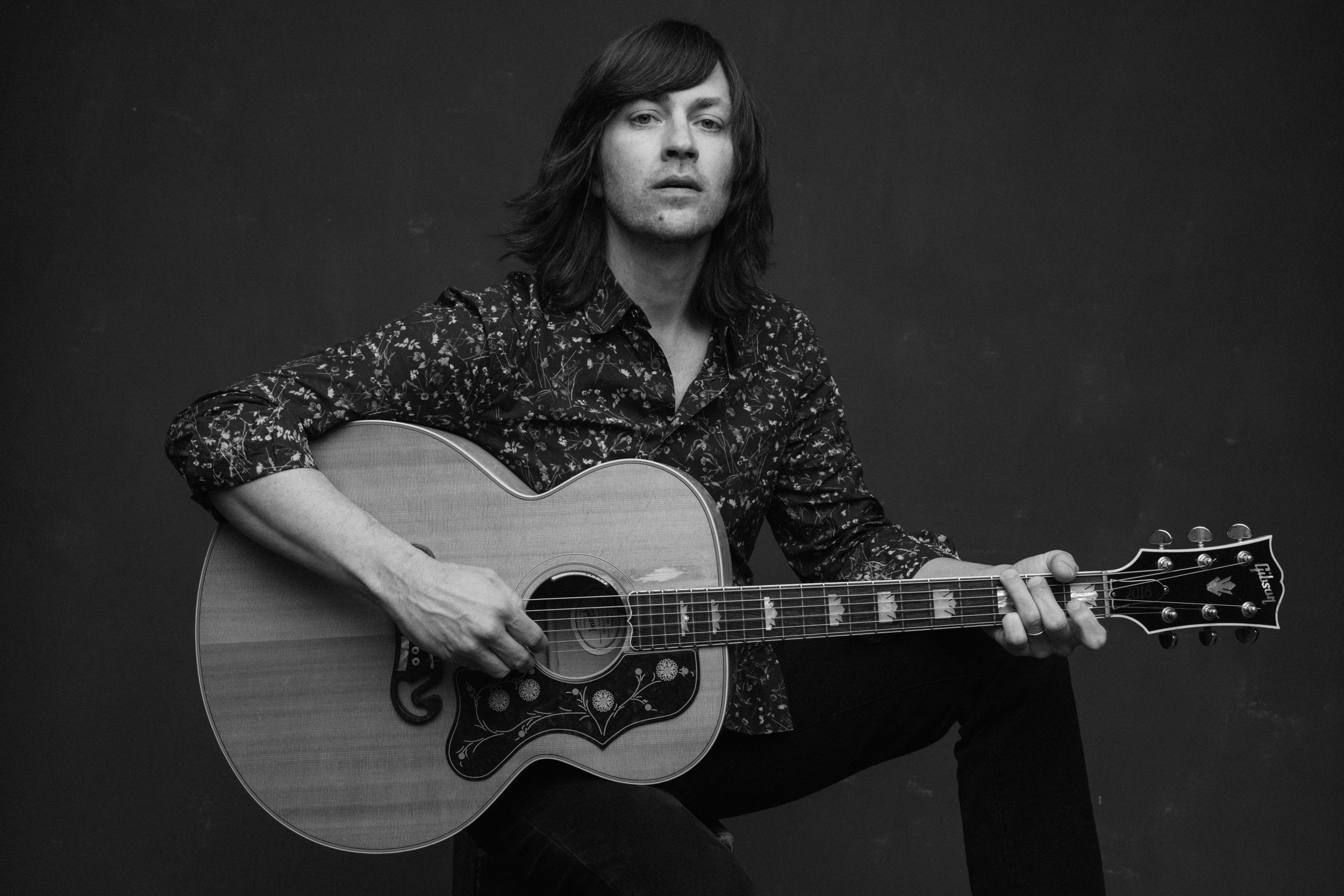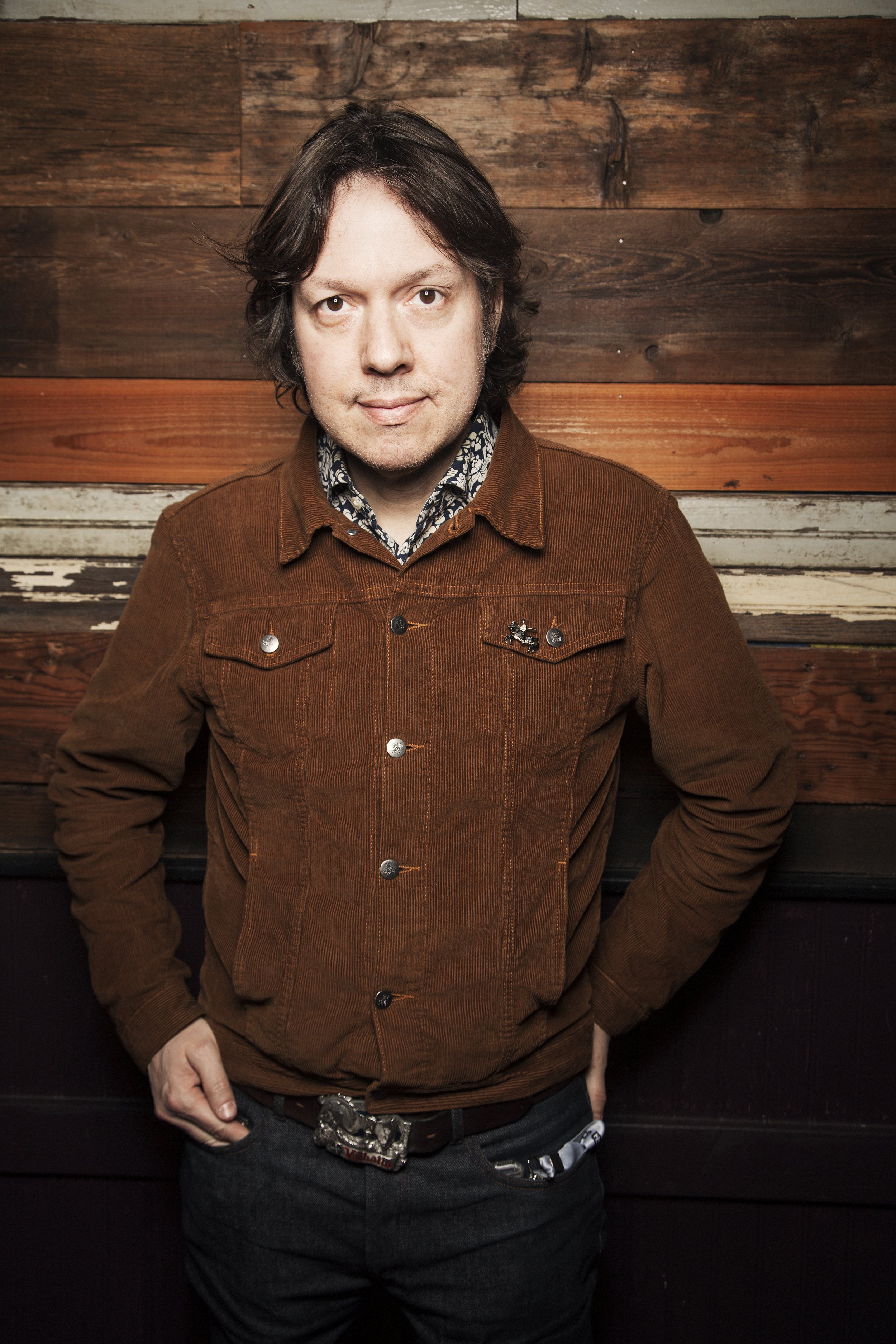Artists
Rhett Miller
Photograph by Shervin Lainez
Texas native Rhett Miller is perhaps best known as the frontman of the Dallas-based alt-country band the Old 97's, although he has also pursued a critically acclaimed solo career. Formed in 1993, the Old 97's built a devoted following with their brash blend of country and power pop influences, making a splash with 1995's Wreck Your Life, which won the group a brief stay on the roster of Elektra Records, a period kicked off with one of their finest hours, 1997's Too Far to Care. All four members also pursued side projects, but Miller's solo career captured the most attention, with the literate songwriter training his eye on such subjects as fatherhood, sex, and love. Making his solo bow with 2002's The Instigator, most of Miller's solo albums have been dominated by cool, melodic pop tunes with a drier and more confessional bent than his work with the band, though 2012's The Dreamer explored a middle ground between his pop and alt-country sensibilities, and the 2011 set The Interpreter: Live at Largo revealed he's a sure hand with other people's songs.
Strictly speaking, Miller launched his own career before the Old 97's were formed. He recorded his first solo album, a series of acoustic folk songs entitled Mythologies, in 1989. Future Old 97's bassist (and a solid songwriter in his own right) Murry Hammond produced the album, and their partnership later blossomed into a full-fledged band. While releasing a string of well-received albums with the Old 97's, Miller and Hammond also performed together as the Ranchero Brothers, a two-man acoustic duo that was originally launched as a means of testing new music for the Old 97's in front of a live audience. The Ranchero Brothers developed their own distinct following, although no albums resulted from the project.
Taking time off from the Old 97's, Miller began recording his first major-label solo effort in February 2002, this time with the help of producer/multi-instrumentalist Jon Brion. The Instigator appeared nearly seven months later, followed by a tour with ex-Crowded House frontman Neil Finn in early 2003. Miller then returned to the studio with the Old 97's, squashing worried rumors that he planned to halt the band's career and focus on his solo efforts. He did, however, find time to balance the two projects, and his second solo release, The Believer, was issued by Verve in February 2006.
After returning to the studio with the Old 97's for 2007's Blame It on Gravity, Miller continued his juggling act by recording another solo album. The self-titled record appeared in 2009 courtesy of his new label, Shout! Factory. His next two solo albums, 2010's The Interpreter: Live at Largo and 2012's The Dreamer, were both released by Miller's own Maximum Sunshine label. After releasing one of the Old 97's' strongest albums in years with 2014's Most Messed Up, Miller took a new turn in his solo career with 2015's The Traveler, which featured backing from the band Black Prairie (which includes several members of the Decemberists) and a guest appearance from Peter Buck of R.E.M. Following more recording and touring with the Old 97's, Miller repaired to Brooklyn, New York, where he cut the 2018 album The Messenger with producer and multi-instrumentalist Sam Cohen, who previously worked with Apollo Sunshine and Yellowbirds. The album was released by ATO Record
Ryan Miller
of Guster
Ryan Miller is the lead singer of the band Guster, composer on a slew of rad films (Safety Not Guaranteed, In A World, Kings Of Summer, Tig, Fundamentals Of Caring), bon vivant and Xiao Long Boa aficionado. He is also handsome in low light.
Jaime wyatt
Photograph by Jody Domingue
Hailed by Pitchfork as one of the “most exciting and skillful storytellers” working today, Jaime Wyatt is the kind of generational talent whose raw, honest lyricism is matched only by the power of her huge, unmistakable voice. Wyatt first began turning heads with her breakout 2017 debut, Felony Blues, which chronicled her now much-publicized battle with addiction and transformative journey through the criminal justice system. Wyatt’s 2020 follow-up, Neon Cross, tackled even more profoundly personal revelations. Both records arrived to universal acclaim, with NPR praising Wyatt’s “remarkable voice” and Rolling Stone lauding her “lush, layered, and complex” performances.
Her upcoming album, Feel Good Recorded with Black Pumas’ Adrian Quesada, takes Wyatt to new heights. Feel Good is bold and ecstatic, built on tight, intoxicating grooves that belie the songs’ substantial emotional stakes. Wyatt’s writing is unguarded and intuitive here, tapping into the deep recesses of her subconscious as she reckons with grief and growth, and her delivery is visceral to match, cutting straight to the bone with equal parts sensitivity and swagger. Taken as a whole, the collection stands as a radical act of creative liberation from an artist already known for pushing limits, a genre-defying work of healing and self-love that tips its cap to everything from Al Green and Otis Redding to Waylon Jennings and Bobbie Gentry in its relentless pursuit of peace and pleasure.
“I wanted to make music you could move to,” Wyatt explains, “but I still wanted it to have heart and integrity.”
Eschewing the traditionally solitary process that begot her early work, Wyatt penned Feel Good in a series of collaborative, freewheeling writing sessions built around infectious drum and bass grooves. Working with different rhythm sections in LA (her former hometown) and Nashville (her current hometown), Wyatt began experimenting with stream-of-consciousness and improvisation on the songs, allowing herself to trust her instincts (as well as those of close collaborator Joshy Soul) as she pulled lyrics and melodies from the ether.
“I really tried to listen to my gut and be in the moment with these songs,” Wyatt explains. “I figured out how to stop overthinking and second-guessing myself, everything started opening up in a really exciting way.”
Wyatt carried that same energy into Electric Deluxe Recorders in Austin, where she and the band cut much of the basic tracks and vocals live to tape before fleshing them out with lush horns, strings, and harmonies.
That natural chemistry is plain to hear on Feel Good, which opens with the driving “World Worth Keeping.” Written in a fit of inspiration Wyatt herself didn’t even understand at the time, the track is a fierce, soulful meditation on the kind of beauty that’s worth fighting for, no matter how hopeless things may seem. “Take a look around you / There’s a world worth keeping,” Wyatt proclaims over a shimmering organ and tremolo guitar. Like much of the album, the track is rooted in a defiant optimism, in a refusal to surrender to cynicism and negativity despite its ever-looming presence. The radiant “Back To The Country” finds Heaven in the simplest places, while the buoyant “Love Is A Place” revels in the freedom of being seen for who you truly are, and the effervescent title track embraces pleasure as a primal necessity. “All I want to do / Just to feel good, is just to feel right,” Wyatt sings, backed by towering gospel vocals.
“I spent a lot of my life feeling like it was selfish to want to feel good, that women were supposed to be meek and quiet and submissive,” she reflects. “I wasn’t born like that, though, and these songs were a big part of learning not just to accept myself, but to love myself, because if you can’t love yourself, then nobody can.”
It’s a lesson Wyatt’s learned the hard way over the years, and the specters of loneliness, loss, and heartbreak haunt the album throughout. The bittersweet “Hold Me One More Time” struggles with an inevitable parting of ways as it builds into a frenzied, cathartic roar; the sensual “Jukebox Holiday” longs for a love that seems to hang perpetually just out of reach; and the stripped-down “Moonlighter” drifts through the world in the dark of night, always on the outside looking in. Even when she’s tackling loss on a more existential scale—the ghostly “Where The Damned,” for instance, draws on the stories of missing indigenous women in a solemn remembrance of the forgotten, while the rousing “Fugitive” examines the aftermath of gun violence—Wyatt still manages to find something to believe in.
“A lot of us grow up feeling like we have to hide who we are just to be accepted,” Wyatt reflects, “but that comes from a place of fear and judgment. Sometimes we need a little extra help to let go of all the guilt and shame and pain we carry. Sometimes we need a reminder to be kind to ourselves and each other.”
Sometimes we just need to Feel Good.
Dave Hill
Dave Hill is a comedian, writer, actor, and musician originally from Cleveland but now living in New York City. He has appeared on Unbreakable Kimmy Schmidt, Girls5eva, Joe Pera Talks with You, Inside Amy Schumer, @midnight, Full Frontal with Samantha Bee, The Tick, The Jim Gaffigan Show, and the new U.S. version of Would I Lie To You among other programs. And he plays a Devo-obsessed weed dealer in the new film Drunk Bus starring Ozark’s Charlie Tahan and Will Forte. Dave has also starred in his own TV series, The King of Miami, on the MOJO Network, which was cancelled even though Dave really liked it.
Dave is a regular contributor to public radio’s This American Life and Live from Here with Chris Thile (formerly Prairie Home Companion) and also hosted his own radio show, The Goddamn Dave Hill Show, on WFMU in Jersey City, New Jersey for five years. Dave also hosts the podcast The Dave Hill Goodtime Hour and is the resident heavy metal expert on Malcolm Gladwell and Rick Rubin’s Broken Record podcast.
Dave performs live comedy in theaters, prisons, and basements all over the world and even opened for Snoop Dogg once, which was awesome.
Dave also plays guitar and sings in his own rock band, Valley Lodge, whose song “Go” is the theme song for HBO’s Last Week Tonight with John Oliver in addition to fronting Painted Doll with death metal legend Chris Reifert (Autopsy, Death). He is also the founding member of Witch Taint, most extremely extreme Norwegian Black Metal band from Gary, Indiana ever probably (go to www.theblackmetaldialogues.com for more info). He also composes music for TV and film.
Dave has written for The New York Times, The Paris Review, Salon, GQ, McSweeney’s, The New York Observer, The Cleveland Plain Dealer, and Guitar World, among other publications, and is author of three books, Parking the Moose (2019 Doubleday Canada/Penguin Random House), Dave Hill Doesn’t Live Here Anymore (2016 Blue Rider Press, and Tasteful Nudes (2012 St. Martin’s Press). His fourth book, The Awesome Game: One Man’s Incredible, Globe-Crushing Hockey Odyssey, will be published by Doubleday Canada and Triumph Books in the fall of 2023. He also smells really great you can ask anyone.
Ken Bethea
of The Old 97’s



